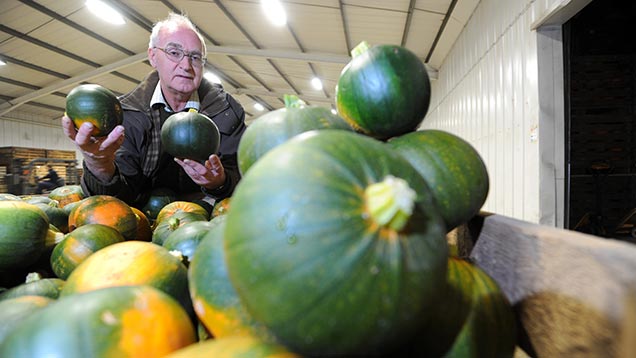Grower speaks out after cyanide blackmailer is jailed
 © Geoffrey Robinson/REX Shutterstock
© Geoffrey Robinson/REX Shutterstock A grower who was forced to destroy £120,000 worth of pumpkins because he thought a blackmailer may have laced them with potassium cyanide has spoken out about the ordeal.
Lincolnshire grower David Bowman produces two-and-a-half million pumpkins a year – half of the UK’s entire crop.
Mr Bowman’s ordeal began a week before the harvest was due to begin in early September.
A letter arrived claiming that some of the pumpkins had been injected with potentially lethal doses of poison.
The letter also contained information about potassium cyanide and included photographs of some of his pumpkin crop being injected.
It warned Mr Bowman “you will go down in history as the farmer who introduced potassium cyanide into the UK food chain” and threatened that unless he paid £50,000 within seven days, more of the crop would be injected.
Fearing he would lose the entire year’s produce, Mr Bowman contacted the police and the Foods Standards Agency (FSA), who told him to destroy the field concerned as a precaution.
Ploughing in the crop cost him £120,000 in lost earnings, but later testing showed the pumpkins had only been injected with water.
Police quickly traced the source of the letters and arrested former soldier Michael Young, 53, of Alfred Street, Boston, Lincolnshire.
In court last week Mr Young, admitted a charge of blackmail between 1 and 5 September and was jailed for eight years.
Judge Michael Heath remarked that the length of the sentence was in part as a deterrent to “anyone who is minded to do the sort of thing that you did”.
Michael Cranmer-Brown, in mitigation, told the court that Mr Young, was in “dire financial straights”, and was “extremely sorry”.
Also speaking in court, Mr Bowman said: “I’ve had sleepless nights worrying how this callous and malicious crime will affect my business.”
In a later interview with the Spalding Guardian, he said: “One order to Spain was cancelled because the Food Standards Agency wanted me to plough in the field to address any public concern.
“The stress for us all has been alarming but we are all relieved to be getting on with the job now.”
And he added: “For some of my temporary workers this is their last big job of the year and [it’s] one they rely on to be able to afford to go home for Christmas.
“They were worried they might lose their jobs and not be able to go.”
